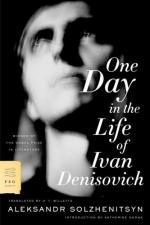|
|
One Day in the Life of Ivan Denisovich Author/Context
Alexander (Sanya) Isayevich Solzhenitsyn was born in Kislovodsk, southern Russia, on December 11th, 1918. Solzhenitsyn's father died in a hunting accident six months before his birth. Growing up in the industrial city of Rostov with his mother, Solzhenitsyn was a gifted student, but his mother's failing health and a lack of money dashed his hopes of attending a university in Moscow. He decided to stay nearby at Rostov University, where he studied Mathematics and Physics. But his desire to be a writer drove him to take literature classes in Moscow while he pursued his studies in the Sciences. In 1940, Solzhenitsyn married his high school sweetheart, Natalya Reshetvskaya. Soon after his graduation in 1941, the Soviet Union was drawn into World War II, and Solzhenitsyn was conscripted into the army. There, he served bravely, earning several medals and a promotion to captain. But in 1945, he was arrested unexpectedly for writing anti-Stalinist comments in a letter to a friend. Solzhenitsyn was given an eight-year sentence.
Alexander Solzhenitsyn was a child of both the Revolution (1917) and the ensuing Civil War in the Soviet Union. His childhood was inevitably marked by the political upheavals of the time. Even during high school, Solzhenitsyn planned on writing an epic novel about the Revolution. But ironically, it was his imprisonment that became the inspiration for his novel about a day in the life of an uneducated peasant serving in a labor camp. Solzhenitsyn, in many ways, based the experiences of his protagonist, Ivan Denisovich, on his own prison experiences. Like Ivan Denisovich, Solzhenitsyn was also a bricklayer in the labor camps.
In 1956, after Khruschev's denunciation speeches against Stalin, Alexander Solzhenitsyn's sentence was finally annulled. With his newfound freedom, Solzhenitsyn faced a different world than he previously knew--his wife had remarried while he was in prison--and the Soviet Union was undergoing political transition. In 1959, he composed Shch-854, the first version of what was to become One Day in the Life of Ivan Denisovich. Through the persistence of Alexander Tvardovsky, the editor of the liberal journal, Novy Mir, the manuscript was published in 1962 with Khruschev's approval. The book's publication caused such an ideological controversy that it contributed to Khruschev's fall from the Communist leadership. Although Solzhenitsyn won international fame almost overnight, the tide in his country began to turn on him, leading to struggles with the KGB and eventually, his exile.
In 1970, Solzhenitsyn was awarded the Nobel Prize for Literature but was unable to receive it until four years later. After his second marriage to Natalya Svetlova in 1973, the couple lived in exile in West Germany and Vermont. In 1994, three years after the fall of Communism and nearly twenty years in exile, Solzhenitsyn and his family returned to Russia. Regrettably, Solzhenitsyn has come to be known mainly as a political figure--the individual most responsible for toppling the Communist regime. However, he is foremost a writer, often compared to other immortal Russian authors such as Dostoyevsky, Turgenev, Tolstoy, and Gorky. The accomplished Russian poet Yevtushenko calls Solzhenitsyn "our only living Russian classic." Solzhenitsysn's works include The First Circle, Cancer Ward, and the Gulag Archipelago--all highly acclaimed by the literary world.
Bibliography
Bjorkegren, Hans. Aleksandr Solzhenitsyn: A Biography. Trans. Kaarina Eneberg. The Third Press, 1972.
Medvedev, Zhores. Ten Years After Ivan Denisovich. Trans. Hilary Sternberg. New York: Alfred A. Knoft, 1973.
Solzhenitsyn, Alexander. One Day in the Life of Ivan Denisovich. Trans. Ralph Parker. New York: Signet, 1972.
Solzhenitsyn, Alexander. One Day in the Life of Ivan Denisovich. Trans. H.T. Willetts. New York: The Noonday Press, 1991.
Thomas, D. M. Alexander Solzhenitsyn: A Century in His Life. New York: St. Martin's Press, 1998.




